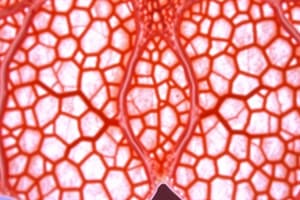Podcast
Questions and Answers
What is the primary function of adipose connective tissue?
What is the primary function of adipose connective tissue?
- Stores energy and insulates the body (correct)
- Attaches muscle to bone
- Provides a supportive framework to lymphatic organs
- Resists compression and acts as a shock absorber
Which type of connective tissue forms a supportive framework in lymphatic organs?
Which type of connective tissue forms a supportive framework in lymphatic organs?
- Adipose connective tissue
- Dense Regular connective tissue
- Reticular connective tissue (correct)
- Elastic connective tissue
What is the main characteristic of dense irregular connective tissue?
What is the main characteristic of dense irregular connective tissue?
- It withstands stress in one direction
- It forms most of the fetal skeleton
- It can withstand stresses applied in all directions (correct)
- It is primarily found in tendons and ligaments
Where is hyaline cartilage primarily located?
Where is hyaline cartilage primarily located?
Which connective tissue is responsible for carrying oxygen to tissues?
Which connective tissue is responsible for carrying oxygen to tissues?
What type of connective tissue is most durable and withstands stresses in all directions?
What type of connective tissue is most durable and withstands stresses in all directions?
The primary function of fibrocartilage is to:
The primary function of fibrocartilage is to:
What hormone-related function is associated with blood?
What hormone-related function is associated with blood?
Flashcards are hidden until you start studying
Study Notes
Loose Connective Tissue
-
Areolar Tissue
- Found in the dermis (lower skin layer), surrounding organs, nerves, muscles, and blood vessels.
- Functions to protect tissues, bind skin to deeper layers, and provide space for blood vessels and nerves.
-
Adipose Tissue
- Located in the subcutaneous layer, around organs such as kidneys, and behind eyeballs.
- Stores energy, insulates the body, and cushions/protects organs.
-
Reticular Tissue
- Present in the spleen, lymph nodes, and red bone marrow.
- Provides a supportive framework for lymphatic organs.
Dense Connective Tissue
-
Dense Regular Tissue
- Found in tendons and ligaments.
- Attaches bone to bone and muscle to bone, resistant to stress in one direction.
-
Dense Irregular Tissue
- Located in the dermis of the skin, covering bones, cartilage, nerves, skeletal muscle, and certain organs.
- Can withstand stresses from multiple directions, making it durable.
-
Dense Elastic Tissue
- Present in the walls of elastic arteries (like the aorta), trachea, and vocal cords.
- Allows for stretching and recoiling, vital for flexibility.
Cartilage
-
Hyaline Cartilage
- Located in the tip of the nose, trachea, larynx, growth plates in bones, and articular ends of long bones.
- Offers support and constitutes most of the fetal skeleton.
-
Fibrocartilage
- Found in intervertebral discs, pubic symphysis, and menisci of the knee.
- Resists compression and acts as a shock absorber.
-
Elastic Cartilage
- Present in the external ear and epiglottis.
- Maintains shape while allowing for flexibility.
Bone and Blood
-
Bone
- Forms the skeleton and provides structure for body movement.
- Supports soft tissues, protects organs, stores calcium and phosphorus, and contains red marrow for blood cell formation.
-
Blood
- Found within blood vessels and the heart.
- Carries oxygen and nutrients to tissues, removes waste and carbon dioxide, transports immune cells and hormones, and aids in blood clotting.
Studying That Suits You
Use AI to generate personalized quizzes and flashcards to suit your learning preferences.




